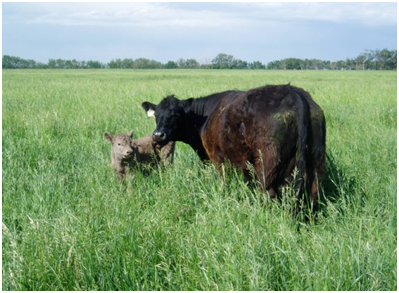Organics is about more than just the food. Often on the news you see studies that compare organic products to their non-organic equivalent. These studies most often look at nutrition and pesticide residues. But eating and buying organic has a much greater effect than just the food that you put in the body. Organics is also about the environment that we all live in. For every certified organic product grown, there are less chemicals being added to the environment.
For us this encompasses our attitude toward the environment and the world around us. We use the ancient Haida saying “We do not inherit the land from our ancestors, we borrow it from our children." We believe that we have to leave the land in better condition than the land we received. We strongly believe that we have to be stewards of the land and of the environment. We feel that by being certified organic and using holistic management, we can be active stewards of the land. We also believe that we can be beyond organic. We have to look at all of our practices and be as sustainable as possible and be the best keepers of the earth as we can be.
There are many ways that we do this. We use time controlled grazing for our cattle. This is a method of grazing that prevents the overgrazing of the land which prevents erosion, allows the grass to naturally reseed itself and provides habitat for wildlife. We also let the grass grow in the fall, this allows for longer winter grazing which in turn allows the manure to be spread out over the land rather than being accumulated in one place.
We want to continue to improve the land. Our goal is to grow topsoil. We use our composted chicken manure as a way to do this. The manure is composted in 2 large in vessel composter units. This compost is then spread on our land and other neighbouring farmers' land. The composting breaks down the manure and makes it safe to spread onto the land. Rotational grazing also allows a lot of organic matter to be put back into the soil. We feed our cattle in the winter on the poorest part of our land. This allows the leftover hay and the manure to improve the soil. Our moveable chicken shelters have no bottom and this allows the manure to be put directly onto the land and then be exposed to the sun. The grass thrives on this mix of organic matter and manure. The grass is often waist high and extremely thick. We see improvement in the soil every year. We also do not use any herbicides or pesticides on the land. This results in a wonderful soil ecosystem full of microbes, bugs and worms.
Water is an essential and important resource for animals and plants and we try to take care of this precious resource. We are part of the Battle River watershed. We maintain and do not alter the natural watershed areas allowing the water to naturally flow towards the Battle River. We collect surface water in ponds (dugouts) allowing natural drinking water to be pumped for our cattle and all of our livestock. The dugouts and natural wetlands are fenced off protecting them from the cattle and allowing wildlife (ducks, geese, deer, coyotes) to use and thrive in the clean water. No herbicides or pesticides are used on our land.
Because of the lay of our land, the water that fills our dugouts only comes from our property. This prevents chemical runoff from neighboring farms from collecting in the wetlands allowing frogs and reptiles to thrive. We love our frogs!
Biodiversity is essential and we believe that all wildlife is important to the ecosystem. We only take one cut of hay so wildlife can have plenty to eat for the winter. This also allows for more snow to collect on the land in the winter providing more moisture to the land and to the wetlands in the spring. We have buffer zones around our land that allow natural untouched habitat for birds, this allows them to nest and raise their young undisturbed. Bird houses are put up to encourage birds to nest; blue birds are a common sight.
We use electric netting around the perimeter of the outdoor chicken shelters to protect the chickens from the foxes, skunks and coyotes. This allows them to live on the land right beside the chickens. We also have planted trees and continue to plant trees. We have seen many different types of wildlife flourish here and have seen more and more diversity every year. Mice, shrews, moles, gophers, badgers, coyotes, porcupines, deer and moose live on our land and we have seen a cougar. Owls, hawks, bluebirds, swallows, sparrows, starlings, robins, crows, magpies, grouse, ducks, geese, shore birds, frogs, snakes and salamanders make their homes here as well.
We believe that being organic is about more than the food. It is about a way of life and a way of business that keeps the environment and human health in the forefront. By using these practices we strive to not only provide our customers with the best and cleanest food possible but also food that has a positive impact on the health of our environment as a whole.
Sheila
Hamilton
See more at: www.sunworksfarm.comFollow them on Facebook at www.facebook.com/SunworksFarm
Contributed by Sheila Hamilton, of Sunworks Farm
Intro by Sheri Hendsbee
Intro by Sheri Hendsbee
Visit our website at http://www.swefm.ca
Like us on Facebook! https://www.facebook.com/swefm.ca








No comments:
Post a Comment